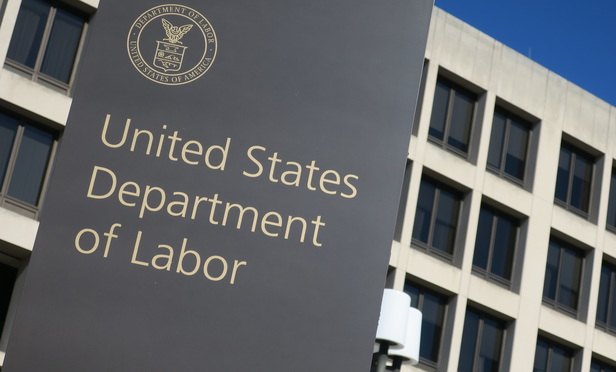 Labor Department headquarters in Washington. (Photo: Mike Scarcella/ALM)
Labor Department headquarters in Washington. (Photo: Mike Scarcella/ALM)
The Labor Department said Friday that its fiduciary prohibited advice exemption to align with the Securities and Exchange Commission's Regulation Best Interest will go into effect Tuesday.
Labor's Employee Benefits Security Administration's PTE, called "Improving Investment Advice for Worker & Retirees," is "broadly aligned" with Reg BI, according to the Employee Benefits Security Administration.
Recommended For You
In the coming days, EBSA said, it will publish related guidance for retirement investors, employee benefit plans and investment advice providers.
Ali Khawar, deputy assistant secretary of Labor for EBSA, said Friday in a statement that "this exemption allows for important investor protections, including a stringent 'best interest' standard of care for fiduciary recommendations of rollovers from ERISA-protected retirement accounts.
"We recognize that investment advice providers have been preparing for the exemption, and this step will allow them to implement important system changes. That said, we will continue our stakeholder outreach to determine how we might improve this exemption, the rule defining who is an investment advice fiduciary, and related exemptions to build on this approach."
ERISA attorney Fred Reish of Faegre Drinker told ThinkAdvisor Friday in an email that over the past few weeks, "Labor has been having remote meetings with representatives of financial sector trade associations and consumer groups, asking whether the rule should be allowed to go into effect. Many of those representatives recommended that the rule be allowed to go into effect."
The groups, Reish said, "felt that they could live with the rule and were concerned that a delay could result in a harsher rule. The consumer groups felt that the rule was fairly robust, though not perfect. However, they believed that later this year the DOL would begin work on a more robust fiduciary definition and that would cover their concerns."
The exemption "permits conflicted compensation, for example, commissions, for fiduciary advice to retirement plans, participants and IRAs."
The conditions of the exemption, Reish said, "are fairly robust."
Reish added that later this year, Labor will likely "start a regulation process to expand the [fiduciary] definition. It's not clear if the [Trump-era] exemption will be changed, but I think it's almost certain that a new regulation of the definition of fiduciary advice will be proposed," and "drafted carefully to avoid the [U.S. Court of Appeals] 5th Circuit decision that vacated the Obama-era regulation."
'Aggressive interpretation' of fiduciary
However, in the preamble to the exemption, Labor "also announced that it is taking a fairly aggressive interpretation of 'fiduciary,'" Reish explained.
For instance, "in most cases, a rollover recommendation to a participant will be fiduciary advice," Reish said. "In a sense there are two 'rules' — the exemption and the interpretation."
The interpretation could also have an impact on recommendations to IRAs, since ongoing recommendations to an IRA owner could be viewed as fiduciary advice, which would be a significant change from current practices.
The best-interest standard in the exemption is broadly aligned with recent rulemaking by the Securities and Exchange Commission (SEC), in particular.
Brian Graff, CEO of the American Retirement Association, said Friday in a statement that ARA is "pleased that the Department of Labor has decided to proceed with the new exemption, which contains important protections for plan participants and certainty for plan advisors who want to work with those participants."
ARA, Graff added, looks "forward to the opportunity to work with the Labor Department as they develop guidance and continue to improve this exemption in the months ahead."
Labor said that its temporary enforcement policy stated in Field Assistance Bulletin 2018-02 will remain in place until Dec. 20.
© 2025 ALM Global, LLC, All Rights Reserved. Request academic re-use from www.copyright.com. All other uses, submit a request to [email protected]. For more information visit Asset & Logo Licensing.







